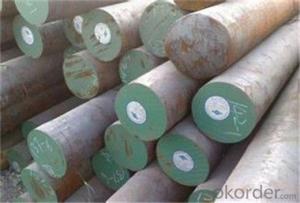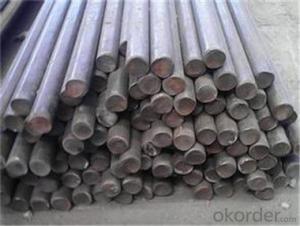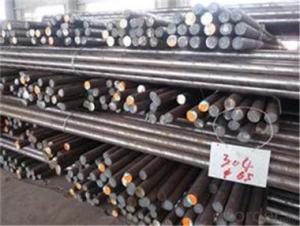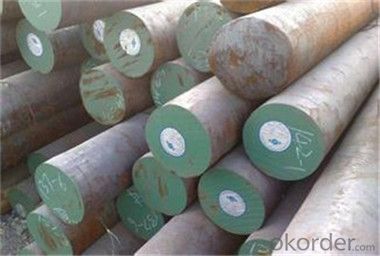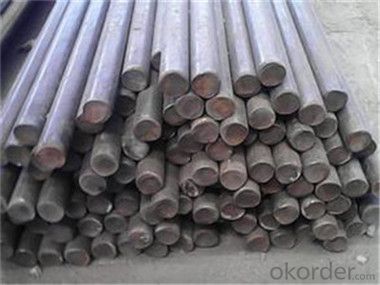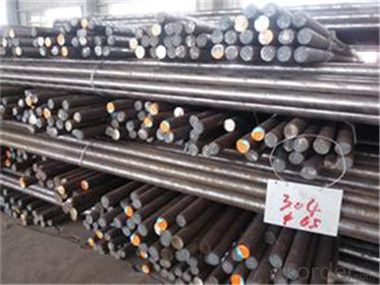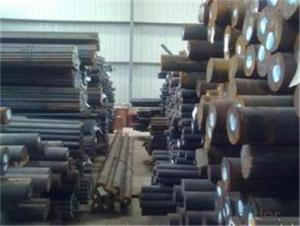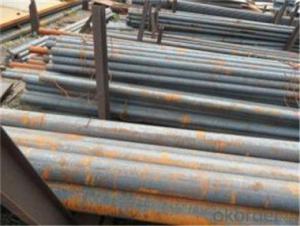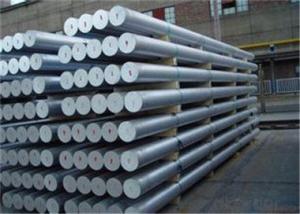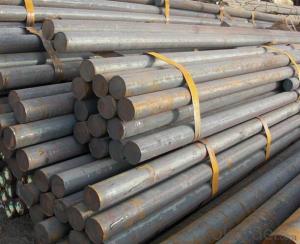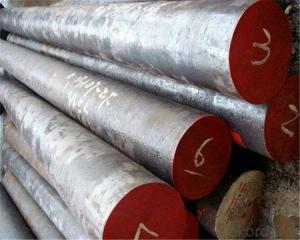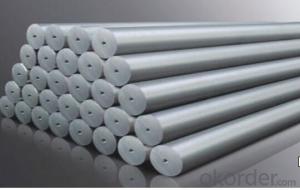42CrMO Forged or Hot Rolled Sae 4140 Steel Round Bars
- Loading Port:
- Tianjin
- Payment Terms:
- TT OR LC
- Min Order Qty:
- 332 m.t.
- Supply Capability:
- 2000000 m.t./month
OKorder Service Pledge
OKorder Financial Service
You Might Also Like
Description of steel round bar:
Mild Steel Round Bar is used for making security grills, screens, Construction and Machine Manufacture.Stainless steel bar is widely used in Architecture,Machine Manufacture,Power Station,Electric Equipment and Factory,Oil and Chemical Industry,Food and Medical Industry,City Decoration Industry
Festures of steel round bar:
Length: standard 6m,9m,12m, or as customers' requirement
Surface: Black, polished, grinded, ,Bright, Turn smooth(Peeled),Brush,Mill,Pickled
Process:Hot rolled,cold drawn,forged
Packing: In bundle, tied by steel straps, covered with protecting film
Use wooden box, fill with foam to keep the surface from damaging
Specifications of steel round bar:
Description : Steel Bar/Stainless Steel Round Bar/Alloy Steel Round Bar/Carbon Steel Bar
Stainless Steel Bright Bar/Stainless Steel Peeled Bar/Stainless Steel Polishing Bar
Diamater:
1 Hot rolled round bar diameter from 5.5mm to 110mm
2.Hot forged round bar diameter from 110mm to 400mm
3.Cold drawn round bar diameter from 2.0mm to 60mm
4.Grinding bar diameter from 4.0mm to 40mm
5.Turn smooth diameter from 40mm to 250mm
Images of steel round bar:
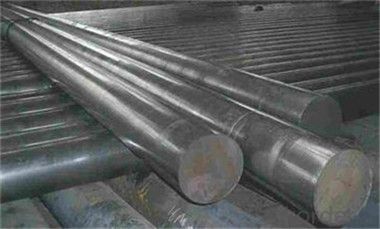
FAQ:
1. What is your main market?
We mainly export to Asia such as Japan,Korea,Thailand and North America and Middle East.
2. How long is the lead time?
Delivery time: 45 days after order confirmed.
3. What payment term do you accept?
Payment: T/T or L/C at sight.
4.Why do you choose to cooperate with us?
We have over10 years experience in this business so we are able to provide you the high quality products with the best price.
- Q: The difference between round face and round bar steel on concrete
- The difference between round bar and round bar is that the surface has longitudinal ribs and transverse ribs, usually with two longitudinal ribs and transverse ribs uniformly distributed along the length direction. The rebar is a kind of small section steel, mainly used for the skeleton of reinforced concrete construction members. In use, some mechanical strength, bending deformation property and welding performance are required. The raw steel billet for the production of threaded steel is carbon structural steel or low alloy structural steel which is treated by calm melting, and the finished steel bar is delivered in hot rolling forming, normalizing or hot rolling state.
- Q: What are the advantages of using tool steel round bars?
- Tool steel round bars offer numerous benefits. Firstly, they boast outstanding hardness and wear resistance, making them perfect for high-stress applications like manufacturing cutting tools, dies, and molds. The hardness of tool steel also enables precise machining, resulting in accurate and intricate shapes. Secondly, tool steel round bars possess exceptional toughness and impact resistance, enabling them to withstand heavy-duty applications without breaking or cracking. This makes them suitable for demanding industries such as aerospace, automotive, and construction. Moreover, tool steel round bars are renowned for their high temperature resistance, maintaining their hardness and strength even in extreme heat. This is particularly advantageous in applications exposed to high temperatures, like forging or heat treating operations. Another advantage is the dimensional stability of tool steel round bars. They have a low coefficient of thermal expansion, meaning they undergo minimal dimensional changes when subjected to temperature variations. This ensures reliability and predictability in various operating conditions. Furthermore, tool steel round bars can be easily machined and heat treated to achieve specific properties. This versatility allows manufacturers to tailor the material to their specific needs, enhancing the overall performance of the end product. Additionally, tool steel round bars are readily available and cost-effective. They are widely produced and stocked by suppliers, ensuring easy accessibility for various applications. Furthermore, their longevity and resistance to wear and tear contribute to their cost-effectiveness. In conclusion, the advantages of using tool steel round bars include exceptional hardness, toughness, high temperature resistance, dimensional stability, versatility, availability, and cost-effectiveness. These properties make them the preferred choice in industries where durability, precision, and reliability are paramount.
- Q: Are steel round bars prone to fatigue failure?
- Yes, steel round bars are generally prone to fatigue failure due to cyclic loading and repeated stress, especially when exposed to high loads or stress concentrations. However, factors such as material quality, design, and proper maintenance can help mitigate the risk of fatigue failure.
- Q: Are steel round bars suitable for the production of fasteners?
- Yes, steel round bars are suitable for the production of fasteners. Steel is a strong and durable material that can withstand high levels of tension and pressure, making it ideal for fasteners. Round bars, in particular, offer a smooth and uniform surface that is easy to machine and shape into various types of fasteners such as bolts, screws, and studs. The versatility of steel round bars allows for customization in terms of size, length, and surface finish, making them suitable for a wide range of fastening applications in industries such as construction, automotive, and manufacturing. Additionally, steel round bars have excellent corrosion resistance properties when coated with protective finishes, ensuring the longevity and reliability of the fasteners.
- Q: What are the advantages of using tungsten-alloy steel round bars?
- There are several advantages of using tungsten-alloy steel round bars. Firstly, tungsten imparts high strength and durability, making these bars suitable for heavy-duty applications. Secondly, tungsten improves the hardness and wear resistance of the steel, increasing its lifespan and reducing the need for frequent replacements. Additionally, tungsten-alloy steel round bars exhibit excellent heat resistance and can withstand high temperatures without losing their mechanical properties. Lastly, these bars have superior corrosion resistance, making them ideal for use in harsh environments or corrosive conditions.
- Q: How do steel round bars compare to cast iron bars?
- Steel round bars are generally considered to be stronger and more durable than cast iron bars. Steel has a higher tensile strength and can withstand greater loads and stress without deforming or breaking. Additionally, steel is more resistant to corrosion and has a higher melting point compared to cast iron. Another advantage of steel round bars is their versatility. Steel can be easily machined, welded, and formed into various shapes, making it suitable for a wide range of applications. Cast iron, on the other hand, is brittle and difficult to work with. It has limited malleability and tends to crack or chip under stress. However, cast iron bars have their own unique properties that make them suitable for specific applications. Cast iron is known for its excellent heat retention and distribution, making it ideal for applications such as cookware and engine blocks. It also has good vibration damping properties, which can be beneficial in certain industrial applications. In summary, while steel round bars are generally considered to be superior in terms of strength, durability, and versatility, cast iron bars have their own specific advantages in certain applications. The choice between the two will ultimately depend on the specific requirements and conditions of the intended use.
- Q: Are steel round bars suitable for automotive applications?
- Yes, steel round bars are suitable for automotive applications. Steel round bars are commonly used in the manufacturing of various automotive components due to their high strength, durability, and resistance to corrosion. They are used in applications such as axles, crankshafts, drive shafts, steering components, suspension systems, and chassis construction. Steel round bars provide the necessary strength and rigidity required to handle the demanding conditions of automotive use, including heavy loads, vibrations, and impact forces. Additionally, steel round bars can be easily machined, welded, and forged, making them versatile and adaptable to different automotive designs and requirements. Overall, steel round bars are a reliable and cost-effective choice for automotive applications.
- Q: How do steel round bars compare to fiberglass or composite bars?
- Steel round bars and fiberglass or composite bars exhibit distinct differences in their properties and applications. Strength and Durability: Steel round bars possess exceptional strength and durability, boasting a high tensile strength that enables them to withstand heavy loads and stress. Conversely, fiberglass or composite bars possess a favorable strength-to-weight ratio but generally lack the same level of strength as steel bars. They may be more susceptible to bending or breaking under high pressure or impact. Weight: A significant disparity exists in weight between steel bars and fiberglass or composite bars. This contrast can prove advantageous in certain applications where additional weight is necessary for stability or to counteract external forces. Conversely, situations that prioritize weight reduction, such as in the aerospace or automotive industries, favor fiberglass or composite bars due to their lightweight nature. Corrosion Resistance: Steel bars are prone to corrosion, particularly when exposed to moisture or harsh environments. Consequently, they necessitate regular maintenance and protective coatings to prevent rusting. In contrast, fiberglass or composite bars inherently possess corrosion-resistant properties, rendering them suitable for applications prevalent in marine or chemical industries that often involve exposure to corrosive elements. Electrical Conductivity: Steel round bars boast electrical conductivity, which proves advantageous in specific applications requiring electrical grounding or conductivity. Fiberglass or composite bars, by contrast, are non-conductive and preferred in situations necessitating electrical insulation, such as in electrical installations or sensitive electronic systems. Cost: Steel bars generally offer a more cost-effective solution compared to fiberglass or composite bars. The abundance of raw materials for steel production contributes to their affordability in most cases. Conversely, fiberglass or composite bars involve intricate manufacturing processes and the utilization of specialized materials, leading to higher production costs. In conclusion, steel round bars are favored for their strength, durability, and cost-effectiveness, finding widespread use in construction, manufacturing, and infrastructure projects. Conversely, fiberglass or composite bars present advantages in weight reduction, corrosion resistance, and electrical insulation, frequently finding application in industries that prioritize these properties. The selection between the two hinges upon the specific requirements and conditions of the project or industry.
- Q: Are steel round bars used in the automotive industry?
- Steel round bars are widely utilized in the automotive industry. They find their application in diverse areas like the production of engine components, suspension systems, chassis, and axles. Due to their exceptional strength, durability, and versatility, steel round bars are highly favored for automotive parts that demand exceptional performance and reliability. Moreover, steel's capacity to endure heavy loads and its resistance to deformation make it well-suited for critical automotive applications prioritizing safety.
- Q: Can steel round bars be used for making oil and gas industry components?
- Yes, steel round bars can be used for making oil and gas industry components. Steel round bars possess high strength and durability, making them suitable for various applications in the oil and gas industry, such as drilling equipment, pipelines, valves, and connectors. Additionally, steel's resistance to corrosion and extreme temperatures further enhances its suitability for these components.
Send your message to us
42CrMO Forged or Hot Rolled Sae 4140 Steel Round Bars
- Loading Port:
- Tianjin
- Payment Terms:
- TT OR LC
- Min Order Qty:
- 332 m.t.
- Supply Capability:
- 2000000 m.t./month
OKorder Service Pledge
OKorder Financial Service
Similar products
Hot products
Hot Searches
Related keywords
